Postny: English Mikenas System A18
1.c4
Nf6 2.Nc3 e6 3.e4 d5 4.e5 d4 5.exf6 dxc3 6.bxc3
Qf6 7.d4 e5 8.Nf3 exd4 9.Bg5
Qe6+ 10.Be2
|
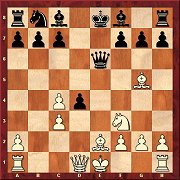
|
|
After the developments of recent years the position in
the diagram has crystallised into the critical one for
the evaluation of the whole line. As Evgeny Postny shows,
Black probably has nothing to fear here. |
Marin: King’s Indian Torre Attack A48
1.d4
Nf6 2.Nf3 g6 3.Bg5
Bg7 4.Nbd2 0-0 5.c3 d6 6.e4
Nc6
|
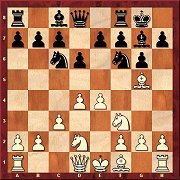
|
|
In the third and concluding part of this series on the King’s Indian Torres Attack 6...Nc6
is examined. It may put pressure on d4 but it has its
disadvantages too. In particular, White can play 7.Bb5 and then things are not easy for Black.
|
Schipkov: Dutch A88
1.d4 f5 2.c4
Nf6 3.Nf3 g6 4.g3
Bg7 5.Bg2 0-0 6.0-0 d6 7.Nc3 c6 8.b3
|
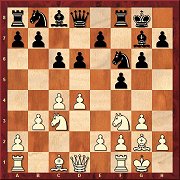
|
|
With 8.b3 (instead of 8.d5 as in the previous issue)
White probably cannot achieve an advantage either. Boris
Schipkov shows several lines in which Black gets
satisfactory play, but the best is probably 8... Qa5.
|
Kritz: Sicilian B35
1.e4 c5 2.Nf3 Nc6 3.d4 cxd4 4.Nxd4 g6 5.Nc3 Nd7 6.Nf3 a6 Bg7 6.Be3 Nf6 7.Bc4 0-0 8.Bb3 Qa5 9.0-0 d6
|
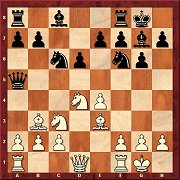
|
|
With the queen move Black forces short castling and the
result of this is quiet positions. White should develop
slowly and avoid any exchange of queens. Black is close
to equality, but he still has a few problems to overcome.
|
Karolyi: Sicilian B90
1.e4 c5 2.Nf3 d6 3.d4 cxd4 4.Nxd4 Nf6 5.Nc3 a6 6.Qf3
|
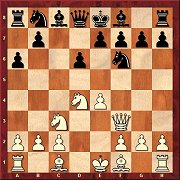
|
|
The
unusual queen move conceals a few ideas, which means
that an unprepared opponent can easily get into
difficulties. Tibor Karolyi analyses literally every
known continuation. |
Ftacnik: Sicilian B99
1.e4
c5 2.Nf3 d6 3.d4 cxd4 4.Nxd4 Nf6 5.Nc3 a6 6.Bg5 e6 7.f4 Nbd7
8.Qf3 Qc7 9.0-0-0 Be7 10.g4 b5 11. Bxf6 Nxf6 12.g5 Nd7 13.f5
0-0
|
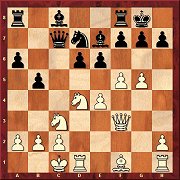
|
|
Recently there has been a clear trend towards 13...0-0 (instead of 13...Bxg5+ or 13...Nc5). In the critical lines after 14.Rg1 Black seems to be able to prove his point, but that will not be easy in practical play.
|
Langrock: French C01
1.e4 e6 2.d4 d5 3.Nc3
Bb4 4.exd5 exd5 5.Bd3
Nc6 6.a3
Bxc3+ 7.bxc3
|
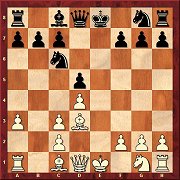
|
|
White will not be able to force an opening advantage with
this form of the Exchange French, but Black has to play
accurately. However, most players are now well acquainted
with the ins and outs and White has an excellent score.
In the first part 5...Nc6 is examined; the alternatives will follow.
|
Kritz: French C10
1.e4 e6 2.d4 d5 3.Nc3
Nc6
|
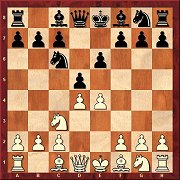
|
|
Although 3...Nc6
gets in the way of the natural French move ...c5, it is
not at all so simple for White to achieve an advantage.
Kritz does not think much of the main move 4.Nf3 and suggests 4.e5!. His analyses show that White can achieve his aim with it.
|
Breutigam: Ruy Lopez C96
1.e4 e5 2.Nf3
Nc6 3.Bb5 a6 4.Ba4
Nf6 5.0-0
Be7 6.Re1 b5 7.Bb3 d6 8.h3 0-0 9.c3
Na5 10.Bc2 c5 11.d4
Nd7
|
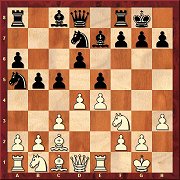
|
|
This time Martin Breutigam examines the alternatives to the main move 12.Nbd2,
but above all 12.d5 and 12.dxc5. Black also has to fight
for equality, but his problems in doing so should not be
too great. |
Grivas: Queen’s Gambit D15
1.d4 d5 2.c4 c6 3.Nf3
Nf6 4.Nc3 dxc4 5.e3
|
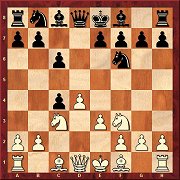
|
|
If
no advantage can be achieved in the main lines of the
Slav, one might as well try 5.e3. The results of
Efstratios Grivas’ analysis are encouraging since White
at least always has a little pressure. |
Krasenkow: Semi-Slav/Catalan D30/E04
1.d4 d5 2.c4 e6 3.Nf3 c6 4.g3 dxc4 5.Bg2 b5
|
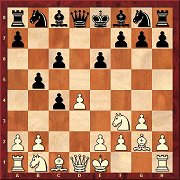
|
|
There are many ways for White to play this gambit
variation, according to whether he plays with or without
a4, Ne5,
Nc3,
b3 or e4. For every plan for White Michal Krasenkow has
the appropriate reply, even in the main line 6.Nc3
Nf6 7.Ne5 a6 8.a4
Bb7 9.0-0.
|
Kuzmin: Queen’s Gambit D43
1.d4 d5 2.c4 c6 3.Nc3
Nf6 4.Nf3 e6 5.Bg5 h6 6.Bh4 dxc4 7.e4 g5 8.Bg3 b5 9.Be2
Bb7 10.Qc2
|
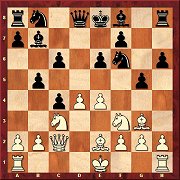
|
|
The setup with 10.Qc2 (and 10...Nbd7 11.Rd1)
does set Black a few problems, but so far it has not
been played a lot. So there is not too much theory and
according to Alexey Kuzmin White is promised the
initiative in the most important variations.
|
Stohl: Grünfeld Defence D70
1.d4
Nf6 2.c4 g6 3.f3 d5 4.cxd5
Nxd5 5.e4
Nb6 6.Nc3
Bg7 7.Be3
|
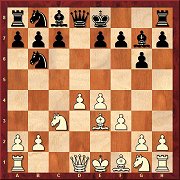
|
|
World Champion Anand played 3.f3 against the Grünfeld
Defence and brought Gelfand to the edge of defeat. As is
proved by the analyses of Igor Stohl, however, Black
should be able to hold the position. |